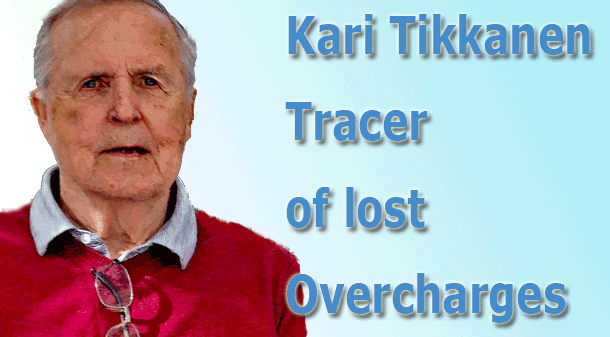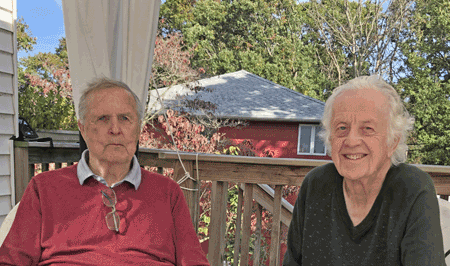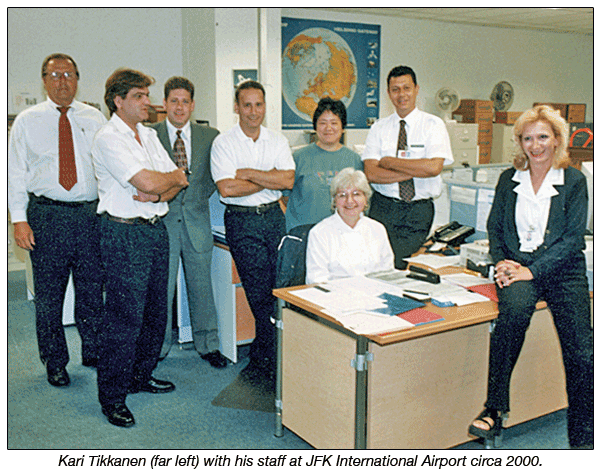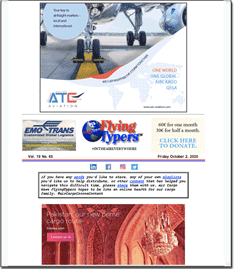 |
A shipment is ordered, the goods arrived
on time safe and sound flown or shipped as booked, and everybody is happy.
Only maybe a decimal point shifted or an
extra zero took a reasonable rate and billed the shipper a lot of money.
Maybe easy to catch for smaller shippers
for sure.
But what about the big corporate guys or
perhaps the medium sized volume shipper.
Believe it, in 2020 overcharges are everyone’s
enemy and during these days can suck the life blood out of profits, even
at times adding up to the difference in success and failure for some companies.
Today, Kari Tikkanen having spent a lifetime
in air cargo and actually retired for some years now, has found a niche
occupation that by training and attitude he is well-equipped to do.
Kari audits shipment invoices; he examines
them closely top to bottom. Today, Kari as tracer of lost overcharges
has recovered hundreds of thousands of dollars.
But we get ahead of ourselves.
 We
are sitting in the back yard up on a deck in West Islip, my friend for
many decades Kari Tikkanen and I. We
are sitting in the back yard up on a deck in West Islip, my friend for
many decades Kari Tikkanen and I.
Kari is an airline cargo guy that worked
for 40 years at Finnair.
I first met him at JFK International where
Finnair operated its New York Cargo Terminal from a portion of (what else)
an aircraft maintenance building, United Airlines’ Hangar 9 at the
airport.
Before his retirement from the airline 16
years ago, Kari had led the charge for air cargo both in North and South
America.
But he was also a key go-to cargo pioneer
who worked himself from the ground up.
“I began at Finnair on August 15,
1962 in Helsinki in the passenger department, then was transferred in
1964 to Arlanda, Sweden. My career in cargo started as Cargo Manager Sweden,
when Finnair launched Douglas DC-8 Combi service on May 15, 1969 to JFK.
In 1984 I was reassigned to Helsinki headquarters and then transferred
in 1986 to New York as assistant cargo manager.
“On the DC-8 Combi the cargo pallets
were loaded up front. The Finnair first class cabin was located behind
the wing on that aircraft,” Kari smiled.
Kari hails from Finland where Santa Claus
resides in a town called Rovaniemi up in the Arctic Circle.
Sure, as he closes into becoming an Octogenarian
at this time next year, age and years in harness and life have created
some challenge.
However surrounded by loving wife Ylva,
and his daughter Nina and her husband Jimmy and a faithful giant Lab named
Molly, Kari paces himself in late Autumn 2020, as he continues in the
embrace of a wonderful life.
Long-Held Connections
Kari was born in 1941 in Mikkeli,
a town near Tuukkala, where Baron Carl Gustaf Emil Mannerheim, a Finnish
military leader and statesman had based his "Pentagon". On May
1, 1942 Kari's father was heading from Mikkeli to Helsinki on a train
when the Russians bombed the train and he was lost. At that time the Russians
were trying to take over Vyborg which is strategically close to St. Petersburg.
Vyborg is still referred amongst some Finns
as “Little Helsinki” for its distinct architecture and local
charm. Vyborg is surrounded, as is most of beautiful Finland, by elegant
white birch trees and deep green pine forests.
Once Vyborg was part of Sweden and later
of Finland, but today is part of Russia after the town and some kilometers
of Finland were claimed by Russia post World War II.
Having just turned 79, today Kari could
be the poster boy for how to plan and execute a long and productive air
cargo business career, and save enough time to seriously retire and enjoy
quality family life.
“I cannot say that I am entirely disconnected
from air cargo,” Kari said
“I think about the years and time
we spent building the Finnair brand
 |
“But I also recall the people, and
without exception, remember that we did a lot of business but also had
a good time,” Kari said.
“The most memorable shipment occurred
during the height of the Cold War when Finnair was hired to accomplish
a complex and highly classified mission of moving all the electronics,
computers, the whole ball of wax from the U.S. via Helsinki to equip the
new U.S. Embassy abuilding in Moscow.
“The U.S. State Department had us
under special security clearances handle some very sensitive equipment
and then move the shipments by armed caravan from Helsinki to Moscow.
“The idea was that the U.S. wanted
to make sure that the new embassy and all that went into it was secure
and not “bugged” with listening devices.
“Although the move was real cloak
and dagger stuff, it also remained on my mind because that embassy was
completed and opened for business on May 5, 2000, almost 31 years to the
date of the first Finnair flights to North America.”
We remember being in Tallinn, Estonia with
Kari, as the local population gathered and sang songs in a park creating
a movement that eventually brought down The Soviet Union.
Kari led the way into Moscow and the TransRussia
Trade Shows as that country worked to emerge from under the yoke of communism.
The feelings of possibilities and genuine
thrill of those early days in the 1990s walking around in Moscow are unforgettable.
So it is probably not too surprising, that
post Finnair, Kari, always a detail man who understood early that winning
and losing in air cargo is often measured in how much you pay attention
to the details, has offered his deft hand to an effort that analyzes airway
bills and digital paperwork looking for overcharges.
In fact, right now as 2020 continues Kari
has turned finding money lost in the transactional weeds and mostly forgotten
as a cost of doing business, into a way to stay a bit connected, although
under COVID-19 the work is conducted from home.
The Finnish Spirit
We have always admired Kari and his Finnish
entrepreneurial spirit, and sharp wit. We have also during our many years
together considered Kari and his dear wife Ylva close personal friends.
While our story here is about some lives
well lived, here is something that just happened last week, which relates
to clear thinking in this pandemic.
After Finnair temporarily laid off a large
part of its nearly 7,000 workforce and its flight traffic was down 91%
in September from the previous year, the airline removed passenger seats
and built up pallets onboard its A330s and then the carrier stuck out
its corporate chin to the world and declared:
“What else are we supposed to do,
go out of business?’
While certain that others looked for options,
Finnair spoke the words and did the action.
Recently AY decided to sell its Business
Class meal selection in supermarkets in a move to keep its catering staff
employed and to offer a taste of the airline experience to those missing
the joy of flying during this pandemic.
“Taste of Finnair,” includes
ready-made dishes include options like reindeer meatballs, Arctic char
and Japanese-style teriyaki beef.
Finnair Kitchen enters a takeaway food sales
market that has boomed in Finland since spring after an estimated 60%
of local work force started working from home due to the COVID-19 pandemic.
For their part, Finnair and the supermarket
hope the meals will appeal to people’s yearning for travel.
Kari meanwhile says, “cargo is absolutely
the right decision for a career.
“I still feel motivated just as always
when I go to work, even today forty years later.
“It’s a people business with
relationships amongst both the airline and forwarder community that have
developed into lifelong friendships.
“It is a wonderful life and I would
do it all over again.
“Kippis” Kari Tikkanen declared,
saluting air cargo Finn style!
Geoffrey
Contact Kari.
|




